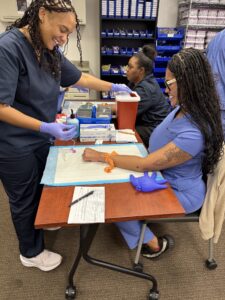We offer Medical Assisting classes year-round, so you can start when it’s convenient for you. Learn more about our program today!
Class Calendar | Call admissions on 415-943-2028
Find Phlebotomy Technician and EKG Technician training at BAMA Institute
Class Calendar | Call admissions on 415-943-2028

Did you know that medical assistants are more essential than ever as the healthcare field continues to grow? According to the U.S. Bureau of Labor Statistics, the employment of medical assistants is projected to grow much faster than the average for all occupations. The reasons for this are an aging population, an increase in healthcare facilities, and higher emphasis on preventive care. With healthcare developing in this way, skilled medical assistants will continue to be in high demand. If you’re considering a career in this field, or are already working as a medical assistant, understanding your potential for development can help put you on a progressively satisfying and rewarding career path. If you’d like to learn all about medical assistant growth, including career advancement, and the skills, certifications, and pathways that can help you advance in your medical assistant career—read on!
Many medical assistants choose to climb the career ladder by furthering their medical education. For instance, completing an associate degree or earning additional healthcare certifications can lead to careers working as a licensed practical nurse (LPN), registered nurse (RN), or even healthcare administration. Continuing education like this also shows employers that you are committed to your career and have the initiative to improve your standing within the workplace and is one achievable way you can assure growth in your medical assistant career.
Getting medical assistant certified is a smart way to advance your career. Certifications like Certified Medical Assistant (CMA), Registered Medical Assistant (RMA), or National Certified Medical Assistant (NCMA) can lead to better job prospects and higher pay. While California does not require medical assistants to hold any specific credentials, employers know certified medical assistants are well-trained and prepared to handle the responsibilities of their jobs from day one. Additionally, looking for medical assistant programs that also include training for phlebotomy and EKG certification can set you apart even more in the job market.
Someone interested in a specific branch of medicine may want to explore medical assistant specialties in that area to achieve career growth. Most medical assistants end up specializing through on-the-job experience. Once they’re in that specialist role, they usually receive specific, on-the-job training to advance their skill sets. The best way to become a specialized medical assistant is to first obtain the general medical assisting certification. Afterwards, you can focus your employment applications on the opportunities within that specialty. One bonus of being a specialized medical assistant, working in areas such as pediatrics, dermatology, cardiology etc., is that you can earn more and enjoy more focused work.
As your career progresses and you gain experience, leadership opportunities at your workplace or another healthcare facility offer another opportunity for a medical assistant to grow their career. Lead medical assistants often oversee teams, coordinate schedules, and help manage operations. If a management role appears to you, strong communication, organization, and leadership skills are essential for this transition—all which can be developed in your medical assistant career from day one.
Experience is a major factor in advancement in any career. As a medical assistant, one way of gaining additional experience can come in the form of volunteering for new responsibilities and showing reliability in your role. This builds trust with your employer and can open doors for further advancement and growth. Additionally, networking with other healthcare professionals—through industry events, social media, or medical associations, may lead to new job opportunities and even mentorship.
It’s common for some medical assistants to choose to move into healthcare administration or management. This career shift often requires further education, such as a bachelor’s degree in healthcare management. However, your experience in both clinical and administrative areas gives you a solid foundation for healthcare management leadership roles.
With career growth, comes the potential for a medical assistant to earn a higher salary. While an entry-level salary for a medical assistant may be modest, experienced, certified medical assistants can earn significantly more—especially in specialized or supervisory roles. Geographic location and workplace setting can also influence a medical assistant’s salary potential, so being open to moving in your career is something worthwhile considering.
The future is bright for medical assistants who have the drive to take initiative and seek growth in their careers. Whether through certification, specialization, or leadership, there are many ways for a medical assistant to advance. By investing in your education, gaining experience, and staying connected in the field, you can build a successful and fulfilling healthcare career. If you’d like to get your medical assistant career started, Bay Area Medical Academy has an employer-recommended and accredited 3-in-1 medical assisting training program. Contact admissions to learn more.
"*" indicates required fields
Our career-oriented program gives you hands-on, real-world training and ongoing support for your long-term goals.
For more information on BAMA's medical assisting and phlebotomy degree programs, contact us today!
BAMA: The Bay Area's best career-oriented healthcare traning
© 2024 Bay Area Medical Academy. All Rights Reserved. Website by WindsAndWater